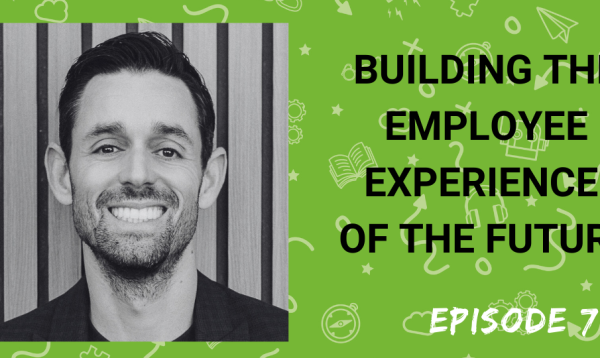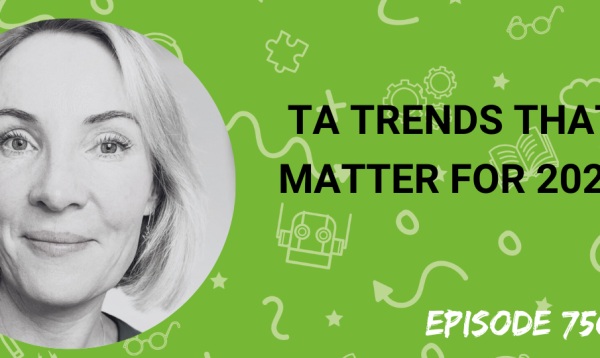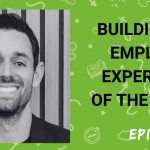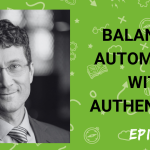The pace of AI adoption is accelerating rapidly, yet most organizations aren’t integrating it effectively into talent acquisition—and they certainly aren’t thinking big enough about its implications. Many companies are simply automating existing processes rather than reimagining what recruitment could become in an AI-driven world.
So, how can talent acquisition leaders think exponentially bigger about AI’s potential, moving beyond incremental improvements to envision and create an entirely new paradigm for talent strategy?
My guest this week is Richard Bradley, who has decades of experience in the RPO space and the wider staffing and TA ecosystem. Richard challenges us to think radically bigger about AI’s impact, arguing that most organizations are severely underestimating the scale of transformation ahead. He explores how forward-thinking TA leaders must move beyond automating processes to reimagining the entire concept of recruitment.
In the interview, we discuss:
• How does AI in 2025 compare to the Internet revolution of the late ’90s
• Ask & Generate vs Search & Consume
• The risks of automating bad processes with AI rather than reimagining them
• How TA technology needs to evolve to be fit for purpose
• Durable soft skills
• The shift from traditional recruiters to talent strategists
• Why TA will evolve rather than disappear
• What the TA team of the future will look like
Follow this podcast on Apple Podcasts.
Follow this podcast on Spotify.
Matt Alder [00:00:00]:
Are we thinking big enough about AI? Most companies are just automating old processes instead of reimagining recruitment entirely. The future won’t be about better sourcing tools or faster screening. It will demand an entirely new approach to how we define talent, structure teams and assess capability. The question isn’t whether AI will change.
Matt Alder [00:00:26]:
Recruiting, is whether you’re prepared for just how radical that change will be. You know, I’ve recently heard some crazy success stories when it comes to hiring with AI. FedEx is sending offers to candidates within 10 minutes, General Motors saved $2 million in recruiting costs in a year, Chipotle reduced time to hire by 75%, and Nestle’s global recruiting team is saving 8,000 hours annually. The craziest thing? All of these companies did it by leveraging the same technology, Paradox. Paradox is the leader in conversational hiring. Powered by conversational AI, Paradox can be your ats, CRM and careers site or can help automate parts of the hiring process on top of Workday, UKG and SAP. Their product suite is driven by a 24/7 AI assistant who can handle up to 95% of the hiring process for deskless hiring teams or just automate specific time consuming tasks like screening, interview scheduling and onboarding to allow recruiters to focus on recruiting. Paradox has helped hundreds of the world’s top employers simplify hiring and save money while creating great candidate experiences in the process. Spend more time with people, not software. With Paradox, you can find out more by going to paradox.ai.
Matt Alder [00:02:14]:
Hi there and welcome to episode 691 of Recruiting Future with me, Matt Alder. The pace of AI development is accelerating rapidly, yet most organizations aren’t integrating it effectively into talent acquisition and they certainly aren’t thinking big enough about the implications. Many companies are just simply automating existing processes rather than reimagining what recruitment could become in an AI driven world. So how can talent acquisition leaders think exponentially bigger about AI’s potential, moving beyond incremental improvements to envision and create an entirely new paradigm for talent strategy? My guest this week is Richard Bradley who has decades of experience in the RPO and wider staffing and TA ecosystem. Richard challenges us to think radically bigger about AI’s impact, arguing that most organizations are severely underestimating the scale of transformation ahead. Hi Richard, and welcome to the podcast.
Richard Bradley [00:03:25]:
Hey Matt, great to be here. Thanks for inviting me.
Matt Alder [00:03:29]:
Absolute pleasure to have you on the show. Just to start off with, could you introduce yourself and tell everyone what you do?
Richard Bradley [00:03:35]:
I’m Richard Bradley, I’ve been working in the RPO space, Boo Hiss for about the last 20 or so years and have been in the wider staffing and TA ecosystem for about 25, 30 years.
Matt Alder [00:03:50]:
Fantastic. So pretty much the same amount of time as me, actually. So thinking about that AI in 2025, it’s kind of similar in a way to the Internet round about 1999, 2000, 2001 in terms of the promise of the change it could bring, disrupting norms and all that kind of stuff. What do you think’s different this time around? And do you think that people are generally underestimating the impact? Are we thinking big enough about AI?
Richard Bradley [00:04:22]:
I think that’s a huge question and I think the short answer is I don’t think people are thinking big enough about AI. I mean, if we start with the similarities and what is very similar about the Internet is back in the 90s, we were told that recruiters were going to disappear recruitment and the whole function was going to completely be revolutionized. The reality is it helped it evolve and we did see some significant changes. And I would argue to some point that probably the last time we saw any sort of significant change in TA was in the 90s. So I think there are some similarities there. I think what may feel different this time is the sheer pace of change. So, you know, if you think the Internet, it took like took about four, nearly five years to get to an audience of 50 million. And if you think about tools in the AI world like Chat ChatGPT, that took two months. So I think a lot of people feel that it’s more like a revolution this time. But the reality for me is I don’t think it is. I think it is just this continual evolution. But it’s gonna, it’s gonna, it’s gonna take less time to reach some of those outcomes. And I think we’re actually gonna be limited by our own thinking and our own approach and adapt adaption to AI than we are the speed of the tools. The big difference for me this time and why I see AI as being significantly different is if you look at the Internet, it changed communication, it changed commerce, it changed entertainment, and it had a significant impact. If you look at AI, it’s going to change everything. It is going to change everything. So I think it’s going to have a bigger, wider impact. And I think when you’re looking at the, the, the way that I would describe it is we’re moving from the, the, the Internet brought us search and consume. We could find stuff, we’d physically go out and find it and we’d consume that information. What AI is moving us to is more around ask and generate. So it’s, it’s creating more of a knowledge based economy rather than a search and find type of economy. And I think that for me is going to be the massive piece that we’re looking here. It’s far bigger than just adding a few tools and a bit of tech, changing your ATS in TA. It’s, it’s going to be a much bigger mind shift in my view.
Matt Alder [00:06:53]:
Yeah, I mean I completely agree with you. I think it’s already kind of starting to eat up a lot of tasks in recruitment. I think we can kind of really see what’s going to happen in the short term. But yeah, I don’t think people are thinking big enough about this. It’s kind of all of the change of the Internet that the Internet sort of maybe over sort of five or ten years like compacted into a really short space of time where people don’t have time to, to adapt or evolve in the, in the way that we used to. And yeah, so huge, huge implications and I suppose on that companies are, employers are starting to add AI to their processes. They’re either sort of experimenting themselves or they’re using tools that they’ve got within their business or the vendors that they’re dealing with in their, in their tech stack are integrating sort of AI in various forms into. Just seems to me though that AI is being integrated but people aren’t changing their processes. They’re in some ways automating bad processes and you know, the outcomes are not, are not necessarily good. What are the risks of doing that and how should TA leaders really be thinking about the change and what they need to do with AI?
Richard Bradley [00:08:00]:
Yeah, I do see that, you know, and I don’t mean ill of any tech vendor. I mean there’s some great vendors out there, but there’s also a lot of snake oil out. We’ve seen a lot of misinformation, we’ve seen a lot of, we’ve seen a lot of, I don’t want to use the word scaremongering but people are unsure. It’s uncertain times, there is going to be change. And I think what, what we’re doing is, we are, we simply are seeing for the vast majority organizations going well, this is the way that we’ve always done it. The most scary words in any business, what they’re Doing is they are quite rightly looking to make efficiency improvements, to improve productivity and to bring tools, etc. To help them do that. There is nothing wrong in that. You know, that is a, that is a good way to use AI and tech and automation today. But the reality is the whole way that we’re going to recruit is going to have to change. If we’re thinking about AI just impacting the way that we’re doing things today and we’re papering over the cracks we’ve all talked about and it’s been there for years about TA being broken, I’m not so sure it’s TA that’s broken. I just think most businesses aren’t thinking big’s big enough. They’re not looking at talent, they’re not looking at the future of their businesses. That puts TA leaders in a really difficult position because on one hand there’s some very enlightened TA folk out there that want to try and drive that change, but it’s being able to take the business with them. There are others that unfortunately are very transactional and it’s those TA folk that I think are going to struggle in this environment. So the big risk for me is that they’re going to paper over the cracks. But if you look at AI today, this is the worst that it’s going to be. It’s only going to get better. So when I hear things like automation and we’re looking at the bias that we’re seeing, I think today I’m not sure AI is getting over issues like bias and it’s getting us to a worse position. I think that will change and I think people need to look at how that’s going to change. There is an over reliance on AI on keywords in terms of how it uses most of its. Most of its screening and sourcing. It’s going to change. So I think for me, look at the tools that help you become efficient today are going to be really key. But I think people have got to start thinking about we’ve actually got to change the way that we recruit and how we hire and what that looks like. And that I think is going to be absolutely pivotal for the way that TA and businesses either revolve or. Or die, frankly.
Matt Alder [00:10:54]:
Yeah, I mean, I completely agree with you. And there just seems to be a real kind of. And maybe it’s just because this is what social media is like, you know, LinkedIn, a real kind of polarization of opinion, certainly people who are kind of speaking out. So, you know, there’s kind of a group of people who are saying that recruitment is finished, humans will have no input in it, and this will happen as soon as next month. And they’ve kind of been saying that for 18 months now. So it’s obviously a rolling, a rolling next month, you know, and that’s fine because I think you need people who are kind of pushing that discussion and pushing the boundaries. But I’ve kind of noticed certainly recently that there’s kind of a second group who are almost like in active denial about the whole thing, you know. You know, I’ve worked in recruitment for 20 years. A machine could never do this task better than me. And they tend to be tasks that we already know an AI can do better than a human, a human in. So it’s obviously, you know, it’s a very emotional, emotional kind of, kind of debate. Where do you sort of stand on that sort of human machine balance in recruiting? Where do you think we’re going to get to?
Richard Bradley [00:11:56]:
I’m certainly in a camp that feels that it’s going to, it’s going to change significantly, but I don’t think, as I said earlier, I talked about revolutionize. I don’t, I don’t see it quite like the Industrial Revolution. And it’s a, it’s, it’s, it’s a, it’s an analogy that gets used a lot. I do think there’s going to be significant change. I think there are large elements that, that people won’t be needed for in the way that they’re working today. So, you know, if you look at a traditional TA function, you know, things like sourcing, screening, some levels of interviewing, I don’t think people are necessarily going to need to have to do those tasks. Where I think it’s going is that you’re going to move from a, the concept of a recruiter, and I use the word like a talent strategist, and you’re still going to need human input, but it’s for different tasks. And for me it’s going to be like looking at more around talent planning, it’s looking at employer branding, it’s looking at, you know, looking at how you use AI tools. So I still think there’s going to be a lot of human interaction in a recruitment process. I think certainly in the next decade, I don’t think people are going to be eradicated from the recruitment and TA world. But I do think that what they do and how they do it is going to change. And I think it’s going to change relatively significantly in the next five to 10 years.
Matt Alder [00:13:31]:
We’ll be back to the interview shortly. I wanted to make a brief interruption to the show to tell you about the Recruiting Future Remixed webinar on I’m running next week in partnership with the team at pop.ai. I’m going to be joined by global TA leader Cheryl White, who’s led TA teams at Bolt, Meta and Microsoft James Atchison Wootton, who leads globally on AI and innovation for Robert Walters and Sam Deschi, MD, of AI recruiting platform Pop. All of them have hands on experience with implementing AI in talent acquisition and we’re going to be cutting through the hype, avoiding the theory, staying practical and sharing actionable advice on just how to do it. The webinar is taking place on Wednesday 30th April and the recording will only be shared with people who sign up. So please register even if you can’t watch it live. You can sign up now by going to Mattalder.me/webinar. That’s Mattalder.me/webinar. Pause the podcast, sign up now and then press play again to enjoy the rest of the interview. Mattalder.me/webinar.
Matt Alder [00:14:45]:
Broadening this out because very often we talk about AI sort of specifically applying to ta, but it’s applying to the whole enterprise. And there are, you know, there are big implications in terms of really in terms of the sort of skills, you know, TA teams will need to recruit for in the future. What do you think those skills for this, the skills that companies need for the AI world are or going to be and how does that impact TA in terms of the approach that it needs to take to secure those kind of skills for the business?
Richard Bradley [00:15:17]:
Yeah, I think that’s a great question. And look, I think I wish I had a crystal ball. This is a personal perspective and what I see and how I’m looking at the world. Looks to me that, you know, we’re hiring people to solve problems using solve problems that we don’t know are problems yet either, using technologies that haven’t been invented yet. So asking somebody have you got 5 years plus experience in using said tool in that type of experience, it’s going to completely change. We’re going to have to be looking at questions more like can you learn and adapt to use this? So, you know, there’s a lot of talk about a skills based economy and moving towards skills based hiring. I kind of get a bit about it because I think we’re looking at the wrong thing. We’re still looking at technical skills for me, where we’re going to start to see Real input. And if you look at some of the startups and you look at, you know, unpopular as people like Elon Musk may be, and the organizations that he’s built, he’s looked at bringing groups of highly, highly intelligent people or people with very strong problem solving and critical thinking. They’re able to make complex decisions and look at what’s involved in those decision making. They’ve got to be able to adapt and have that learning, agility. And I think even more, you know, that idea of AI literacy is going to be really important. So for me it’s those kind of how do you think about things, how do you learn, how do you deconstruct? And I think that’s something that’s going to be, you know, incredibly, incredibly important and something that I think, you know, as a father of three boys, our education system, both in the UK and particularly in the US is failing. That’s why I posted that video a little while ago. You know, shift happens from 2010 because, you know, 15 years later we’re still talking about, you know, a failing education system. So, you know, you could get me on that all day long, Matt, but I’ll stop before I go down a rabbit.
Matt Alder [00:17:31]:
Me too, Me too. I think I’m gonna have an episode in a few weeks, it’s just a panel of people ranting about the education system, but it’s kind of true I mean, it’s the, you know, if you think about the, I always say this, if you think about the workforce in 10 years time, you know, all these changes will, will be sort of embedded, as it were, and probably things that we can’t even imagine are changing. The workforce of 10 years time is either working or in the education system. We could already see the skills that they’re going to have based, based on that. So, yeah, it’s kind of a big thing. From a TA perspective, do you think that recruiting as it is at the moment is set up to properly kind of assess and identify those kind of skills and people with that, that kind of potential?
Richard Bradley [00:18:12]:
Is the really short answer. And I think, I think it’s been something that’s been missing for, for quite a while. You know, I’ve, I’ve done quite a bit of work with Alan Bourne who’s, who knows this topic inside out. And, you know, you see lots of stuff around is using AI, cheating, how do you manage AI out of a, out of an interview and selection process. And I understand all of that. For me, we’ve, we’ve spent far too long you know, resumes, interviewing, we’ve been talking about that being outdated for a century. You know, it is, it’s just, it’s outdated. And I think we’re going to be moving away from using CVs, resumes, I think we’re going to move away from that. And I think the part that’s going to play in assessing these types of skills and understanding how people think are going to be significant. And that is going to be a significant part of, of the recruiting process. So when we talked about earlier about recruiters doing things differently, I’m not sure recruiters are going to be doing much interviewing in the future. I think a lot of them will be understanding how do you assess a particular set of skills, how do you use a set, a set, particular test, how do you interpret those results? And hiring managers will be doing the, the empathy, how does somebody engage? And I think we’re already starting to see some of that stuff start to creep in. We’re seeing more engagement with hiring managers being involved in the recruitment process and with the right training and education, I think that’s a really positive thing. The challenge is like a lot of things, we throw people in the deep end and hope they swim. And you just can’t do that. When you’re talking about the risk that presents to a business and how you’re going to look at developing the growth of your business, you need something that’s a little bit more tangible.
Matt Alder [00:20:12]:
Let’s talk about tier technology. So obviously Gen AI has kind of taken talent acquisition by surprise, but it seems it’s also taken a lot of the established vendors by surprise as well. And I think we’ve seen a kind of an arms race or a struggle to relaunch their products with AI in it. We’re also seeing a fair amount of money being invested in AI driven recruiting startup. So it’s kind of, you know, change is happening. How does that technology need to evolve to be fit for purpose?
Richard Bradley [00:20:40]:
Yeah, I mean if I had the, if I had all of the answers to how to do this, you know, what you need to do and how you do it are two very different things. And I want to be very clear here. I think a lot of technology vendors get a hard time about user experience and how things operate. I’m not sure it’s as easy to do as I would like it to be in the real world. We’re talking about workday successfactors. Oracle iSims are the big players that a lot of HRIS systems are based around and they’re Awful. They’re really clunky, they’re not particularly user friendly. If you go outside of that and you look at businesses like Amazon, whether you love them or loathe them, the experience of buying something on Amazon is really easy. It’s click, click, click, done. And what I think we are going to start to see is organizations needing to be thinking about how do we make this more intuitive. A lot of stuff at the moment is menu driven. We’re talking about, you know, moving from, you know, sort of search and consume to, you know, to be able to ask and generate. I think that is going to be what we’re going to start to see within some of those types of technology. But it’s not going to be easy. I think the last point I’ll make on that, and this is an age reference, Matt, so you, you’ll probably get this because we’re of a, of a Silma ilk. Amstrad always used to make the first of everything. You know, it made the first vertical record player and they were never particularly great. And it was the organizations that came second or third gen that kind of looked at the problem, took a step back, didn’t try and do some sort of knee jerk reaction and then said, we’ve looked at what’s trying to happen, we’ve looked at the direction of travel and we’re creating something. The question is, are people ready and are they thinking big enough about what the future has? And I think that’s the challenge that you’re getting, is that push pull. So for a lot of tech companies, they’re thinking we need to generate revenue today composed to what’s going to actually help the organization in the future. And I think that push pull and that short termism is what impacts ta, not just in tech but everywhere.
Matt Alder [00:23:03]:
Yeah, no, I completely agree. I think it’s one of the biggest sort of challenges to deal with. So as a final question and probably by way of summary actually, because we’ve sort of covered some of the things that lead into this already, but what do you think the TA team of the future is going to look like? Will there even be a TA team in the future?
Richard Bradley [00:23:21]:
Yeah. So I think that the resounding answer to that is yes, there will be a TA team of the future. I think TA is going to be as integral in the future as it is today, but it’s going to look very different. It is going to look different. And you know, if you’re sat there thinking that I’m a recruiter and I’ve always worked this way, and these are the skills that I have. That is going to change, that is going to be disrupted. I genuinely believe that how much is going to be. Is going to be disrupted, I don’t believe is going to be down to the capability of technology. It’s going to be down to the capability of our ability and our ability to change our mindset and the ability to change the future. Recruitment isn’t about replacing recruiters, it’s about replacing outdated hiring models. That, for me, is what it’s all about. So, as I alluded to earlier, you know, I think we’re going to see a move to more predictive outcomes. I think we’re going to look at workforce planning is not going to be done through Excel spreadsheets any longer. It’s going to be a tool that allows people to understand where they’re at, what’s happening, the demographics of their organization, you know, the level of attrition that’s going to happen, what’s happening in the workforce, what’s the future? I think all of those things, those predictives are going to come in, and therefore, I think the role of tea, as I mentioned, is going to be more around talent strategy. It’s going to be the things like you’re talking about talent intelligence, you’re talking about looking at how you’re going to use those tools, and it’s going to be moving away from things like sourcing and screening and interviewing. They will have a part to play, but they will evolve. And by that, I don’t mean we’re going to start just seeing people doing more video interviewing. You know, the reality is people don’t like video interviews, and we’ve been trying to do that for years. It’s going to evolve. And as I said and alluded to before, you know, how we assess talent is going to have to change because what we’re assessing is different. And therefore the whole view for me is that TA is going to fundamentally move forward, because it’s going to need to. And I think we’re going to see things like candidate experience, designers, we’re going to see community managers, workforce strategists. These are the kind of jobs that I think the future we’re going to see in TA rather than recruiters. So, you know, I could talk about it for hours, but, you know, the reality is to your question, do I think TAA is going to be here forever? Yes. Do I think it’s going to fundamentally change? Yes. Do I think it’s going to happen in the next 18 months? No, it’s an evolution and not a revolution. That’s my thoughts.
Matt Alder [00:26:17]:
Richard, thank you very much for talking to me.
Richard Bradley [00:26:19]:
Been an absolute pleasure. Thanks for having me.
Matt Alder [00:26:21]:
Matt My thanks to Richard. You can follow this podcast on Apple Podcasts on Spotify or wherever you get your podcasts. You can search all the past episodes at recruitingfuture.com on that site. You can also subscribe to our weekly newsletter, Recruiting Future Feast, and get the inside track on everything that’s coming up on the show. Thanks very much for listening. I’ll be back next time and I hope you join me.








